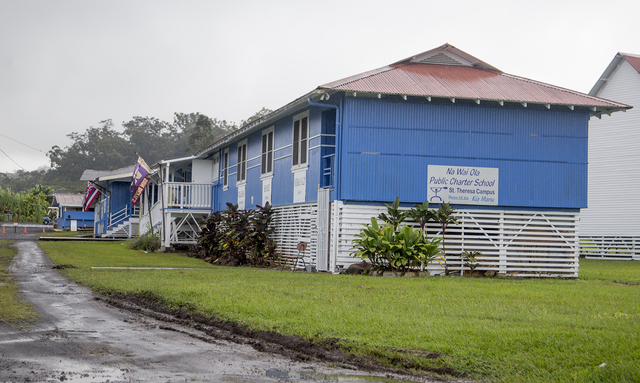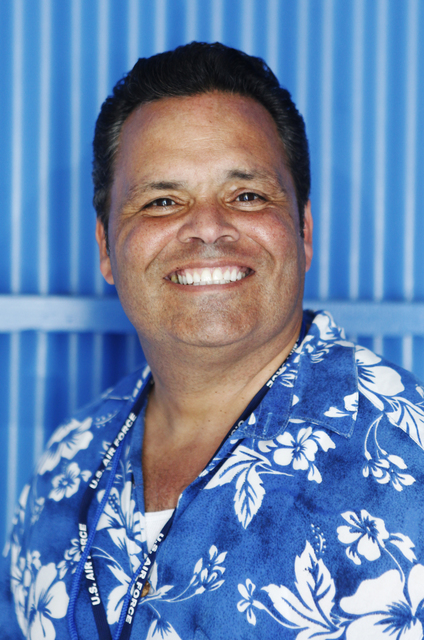Na Wai Ola Public Charter School in Mountain View is working to find funds to make its payroll after overextending itself in an expansion at the beginning of the year.
This week, some parents of students at the school expressed concern after media sources reported it faced the possibility of losing its charter because of the shortfall.
However, in a Tuesday phone interview, Hawaii State Public Charter School Commission Executive Director Tom Hutton said those concerns likely were premature.
“This school year, because their population expanded and they needed to do hiring and addressing crowding in the classroom, they got a new facility,” he said. “They’re at the point now where the current payroll is not sustainable for the rest of year, assuming no new sources of revenue, based on their expenditures at the beginning of year. But they’re aware of this, and the governing board and the administration have been working on the issue.
“… I’ve been over there to work with the governing board and meet with the staff. This is a school administration and governing board that have been forthcoming and cooperative, and we know that they are working hard on this. At the next commission meeting in January, we will need to update the commission about the actions the school has taken, and we have every reason to believe that they will be able to do that.”
The charter school, which now serves about 208 keiki, took on extra expenses this year when it added a seventh-grade to its program, as well as pre-kindergarten classes, said Principal Dan Caluya.
As a public charter school, Na Wai Ola does not receive funding for its facilities, which can place an added burden on the school. This year, the school received $1.4 million from the state in per-pupil funding.
“We all have our challenges,” he said. “We’ve been doing this for years. We are making adjustments, and we are going to be able to make our payroll.”
Caluya explained that the school was operating some classes under a tent on its campus, which is provided by St. Theresa Church. The addition of seventh-graders and the pre-K classes necessitated the leasing of new portable classroom for its students, a large portion of whom are homeless, he said.
“That’s part of the cost of doing business,” he explained. “I got tired of putting kids in tents and substandard learning environments. We can’t keep putting kids under a tent. They live in tents. Why do they have to be in them when they’re here, too?”
Caluya — whose arrival at the school six years ago marked a surge in its performance on state assessment testing and expansion of the student body, as well as the addition of programs including a daily meal for the homeless — said he was sure that the school community would address the funding shortage and continue to ensure the school’s success.
“We’ve been having to do this since I’ve been here,” he said. “(The parents), they know we’re going to make it through. It’s not a secret that charter schools have a tough time every year. Our situation just happens to be amplified. … We’re going to hit some speed bumps along the way, but I have full faith in our board.”
The portable classroom, which was previously used by Keonepoko Elementary during the approach of the June 27 lava flow in 2014, costs about $110,000 a month, Hutton said. To cover the added expense, the school is working to adjust its payroll.
“There may be a variety of things they can do,” Hutton said. “There may be some positions that are phased out. … One part of the funding charter schools receives covers all employee fringe benefits, which is a very significant amount. They also get federal dollars under Title I, II and III. And many schools augment those public dollars with a lot of private fundraising. Some schools are more successful at private fundraising than others.”
The charter schools director said Na Wai Ola often has trouble securing large private donations because of the economically depressed area it serves. But, “they have a pretty compelling story that could, in theory, attract funders. They serve a very needy population, and they do a lot of heroic work.”
He added that the school already talked with the state Department of Education to cover funding for a special education position.
“There are a lot of tools at their disposal to bring their payroll up,” he said.
Should the school show that it can cover payroll through the end of the academic year on July 20, the charter commission will take no action in regard to revoking the charter, he said.
“There is cause for concern, but there is not cause for panic,” Hutton added.
Email Colin M. Stewart at cstewart@hawaiitribune-herald.com.









